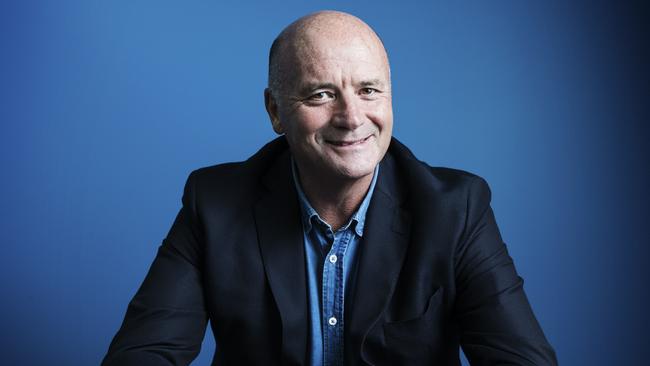How TSE’s Paul Smith coped after selling Repucom
It should have been the sweetest deal of a hugely successful career, but for this entrepreneur it was the beginning of a desperate descent.

Paul Smith calls it “corporate depression”. And he says it hit him hard after he sold his sports data and consulting firm Repucom in a $US195 million ($260 million) deal in June, 2016.
The last thing he wants is for anyone to feel sorry for him, given he walked away with more than half the proceeds and he and his family are financially set for several generations.
But he does want his experience to be a cautionary tale for entrepreneurs who pour their heart and soul into their business and then sell out for big dollars — only to find they have no idea what to do next.
More than two years after selling Repucom to the New York Stock Exchange-listed Neilsen, Smith hasn’t blown his money. But the wealth certainly hasn’t made him any happier.
“I f . . king hate money,” he says. “I hate having it. It causes me heartache, it causes me distress. It doesn’t define me, though it’s part of me. I get it. I’m mindful of how this comes across to someone out on the street, but I’ve lived there. I grew up as the youngest of five kids on a housing commission estate in Warilla [near Wollongong, south of Sydney].
“The money makes no difference to your life, though. I fell off a cliff after the sale and I didn’t know if I would come out of it. The things that define you are taken away. I use this term ‘corporate depression’. The juices that used to flow just don’t anymore.”
Smith was working at his first firm, Total Sport & Entertainment (TSE), in 2004 when he formed Repucom as a specialist company valuing and measuring sports sponsorship deals. It was four years after the Sydney Olympics and corporates were asking more questions about the return on their sponsorship investments.
Repucom’s data-crunching was a hit and Smith soon began thinking about taking the business overseas, starting with India and Singapore. Then he decided to swing for the fences with a move to the US, where the sports business industry was huge but still relatively unsophisticated compared with the intensely competitive Australian market.
Smith moved to New York in 2007. He recalls his then wife searching for an immigration lawyer in the Sydney telephone book: “We rang someone who told us that, no, she helped people come to Australia, not move overseas, but she recommended a guy in New York.”
The world was about to be rocked by the global financial crisis, but Smith wasn’t concerned. Business had been good, and it got even better when corporations and sports organisations suddenly needed more data and deeper analysis to justify spending on sponsorship and corporate entertainment. The NFL became a big client, along with other big sports governing bodies such as the NBA, FIFA, UEFA and several English soccer clubs.
‘Smith agreed to stay on for another 15 months to help with the transition, or so he thought. Then things started to unravel.’
Says Smith: “I remember saying to my guys in early 2008, this is our moment; there’s never going to be a greater demand for data than now. It’s not a matter of not being able to afford it – they can’t afford not to have it.
“So suddenly everybody had to have it, and the GFC was the turning point. The reality is that once that starts, it’s like you can’t put the toothpaste back in the tube. You become a line item in the budget. I remember [private equity firm] GF Capital calling around some of the clients we had in 2010 before they bought into us. One of them told them ‘these guys sell crack – we’ve gotta have it’. That’s just the way it is.”
The investment from GF Capital had been serendipitous for Smith: he had met a GF executive on the recommendation of his immigration lawyer, who had in turn met the private equity player at a cooking class.
Smith said the relationship he had with GF was “brilliant” and that he would do business with them again. But he laughs as he recounts how he never believed the adage of private equity having an investment timeline of five years until Repucom and GF started growing a little tired of each other, after about four and a half years.
It was time to explore a sale process. Repucom’s revenue was mostly recurring, it had the ability to keep just about all its client base long term, and it made good profits annually. Interest was strong. Following some tough negotiations, an all-cash $195 million deal to sell the entire company to Neilsen was struck in June 2016, with Smith agreeing to stay on for another 15 months to help with the transition.
Or so he thought, as he stood alongside Neilsen executives to lead a town hall-style meeting with his staff at Repucom’s Connecticut office. Then things started to unravel.
“I go back to my desk and I haven’t got anything to do,” says Smith. “Clients are calling me and I’m saying yeah, I’m hanging around. But suddenly there are all these meetings going on around the office and I’m not in any of them.
“I thought, this is weird. I wasn’t going to go barging in and say, what is going on? All day. Nothing. Not invited to anything. No one was speaking to me. The next morning I came in and nothing changed.
“I completely misread the situation. I thought that I would be involved, but they didn’t want me to be. I realised pretty quickly they did not want me running anything or having a management role. So I left.”
In hindsight, Smith says he should have documented what his exact role would be so it was clear what he would do for 15 months. But he thought he would come across as “a douchebag walking away with a bag of cash but worrying about some nickel-and-dime role”.
Instead, when the millions finally arrived Smith was sitting alone in his Connecticut apartment sipping a cup of tea. “The next morning I woke up, after the closing, and it was one of the most uninspiring moments,” he says. “There was nothing.”
‘What helped even more was reconnecting with school friends and a big university crew via a Facebook group his more tech-savvy daughter helped set up.’
He walked away with a fortune, but he did not know what to do next. He stopped returning emails and phone calls, and felt bitter about Neilsen. He had no plan for life after Repucom.
By now his marriage had also ended, and his immediate family was back in Australia. Smith sought professional help but couldn’t make a connection with the therapists he engaged. He says the psychologists were unsure what emotional issues there really were for a guy who sold a business for a lot of money and then walked away.
More helpful was his self-diagnosis after reading about other entrepreneurs who sold up and struggled in the aftermath.
What helped even more, Smith says, was reconnecting with school friends and a big university crew via a Facebook group his more tech-savvy daughter helped set up when he moved back to Australia. That group, he said, was interested in him, not what he had done in business.
Smith has since revamped his old firm, TSE, and wants to have another shot at building a business in the Australian sports industry. He says he wants to nurture the staff who kept working while he was in the US with Repucom.
TSE will do much more than crunch data, and will advise sports and brands about sponsorship. It will also own some events and sporting assets. It has already bought a controlling stake in the Sydney Kings, a National Basketball League club, after missing out on buying 50 per cent of NRL side St George-Illawarra. Smith has plans to bring in other investors to expand the business.
He has also made some personal investments in some start-ups and begun mentoring a group of emerging entrepreneurs, mostly in the hope he can talk more about his experiences. And he has some sage advice for the private equity industry.
“I remember meeting the GF guys a while after for a bit of a debrief. I said ‘I feel really shit’ and they laughed and said ‘yeah, that happens all the time’. I said, for f . . k’s sake, can I give you some advice – and remember they are always trying to convince people to sell their companies: get people ready for this. Warn them, talk to them about this. Tell them, get ready, because you’re going to be falling off a cliff.
“And the ones I’m trying to help, I’ve said ‘I’ll be there for you; talk to me’. It’s like you know on the GPS there’s a sharp bend in the road coming up. All I’m saying is tap the brakes a bit — here comes the sharp turn. Be ready for it.”

